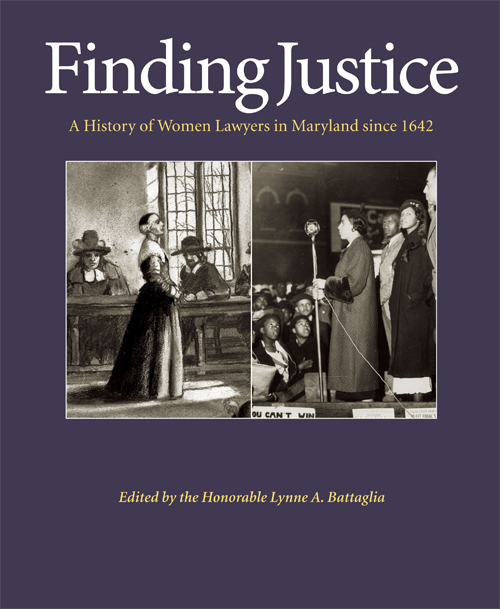
| |
 |
Finding Justice A History of Women Lawyers in Maryland since 1642 edited by the Honorable Lynne A. Battaglia with essays by Phoebe A Haddon, Andrea M. Leahy, the Honorable Diane O. Leasure, Michelle R. Mitchell, Jane C. Murphy, and the Honorable Julie Rubin Although women were not officially permitted to practice law in Maryland until 1902, when they were first able to sit for the bar exam, the history of women acting as lawyers in Maryland is storied, going back to the earliest decades of colonial America. Today, of course, women serve not only as lawyers, but also as judges, professors, business leaders, and elected officials, from local government to the U.S. Senate. Finding Justice tells the remarkable story of how women overcame historical obstacles—legal, social, and economic—to enter the legal profession and how their pioneering work has influenced the practice of law and society at large. Finding Justice offers the first comprehensive overview of the contributions women have made to the legal profession in Maryland, including detailed chapters on the history of women as lawyers since 1642; how social and political movements, both national and local, influenced women's access to the legal profession during the early twentieth century; how women of color had to overcome the dual barriers of race and gender to become lawyers; how community support, especially from family members and mentors, was crucial in helping women overcome the many obstacles to legal careers; and oral histories that reveal the personal stories of many women lawyers. The volume also includes a list of the nearly 25,000 women admitted to the Maryland Bar since 1902. Finding Justice is a unique, scholarly tour de force. Even as the book presents the past accomplishments of women lawyers, the difficulties they overcame, and what resources were critical to their achievements, it also looks to the future, as women continue to face obstacles in pursuing legal careers. By understanding better the history of women lawyers, it is hoped that the future of law in Maryland as well as the United States will be one of increased diversity and accessibility. Excerpt "You have helped pave the way [for me and for women]—all the way from Maryland!" "Today, women in Maryland serve in the legal profession with distinction at all levels, whether as lawyers, judges, professors, or elected officials. The fact that some women have achieved prominence in the law obscures the significant barriers that still remain and disconnects us from the struggles faced by women historically. By understanding and embracing the history of women in the law, including the recent past, we can determine what forces bridged the legal system from exclusion to inclusion. Knowing how individual women in their professional and personal lives contributed to this societal change will help forge a secure foundation for future women in the law. This project will showcase these women's achievements, lives, and goals in an historical context; it will describe and preserve the efforts that ensured the place that women lawyers enjoy today; and the project will illuminate the goals that have yet to be achieved by future generations of women in the law." |
$65.00 U.S. (short discount) No e-book has been authorized. Published in May 2015 Distributed by University of Virginia Press Published in association with the About the Author and the Essayist Book Eventscoming soon
|